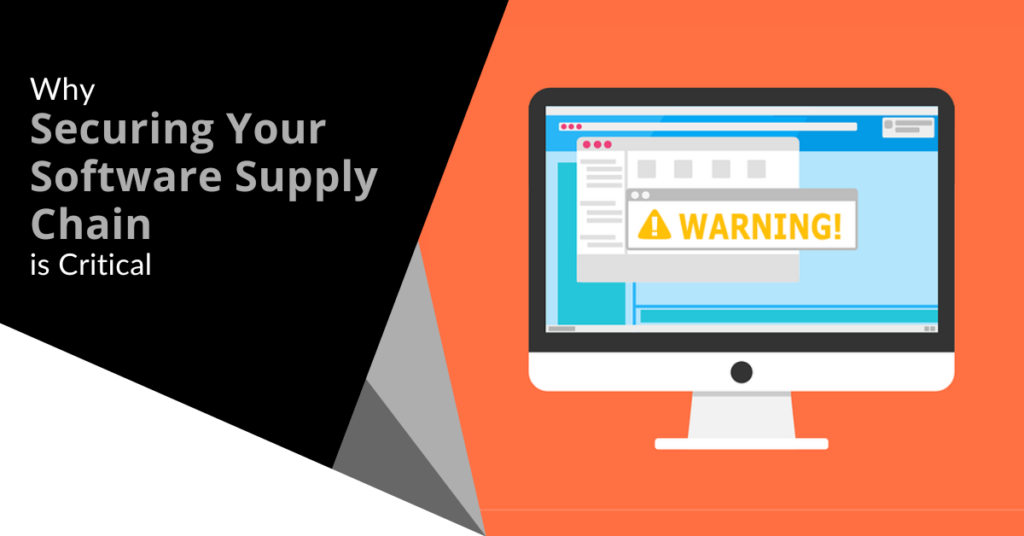|
Getting your Trinity Audio player ready...
|

In today’s increasingly interconnected world, safeguarding your business software has never been more critical, whether it’s hosted on-premise or in the cloud. Ensuring the security of the entire software development and supply chain delivery process is essential. From the development tools to the methods used for updating your systems, every phase plays a crucial role. A vulnerability or breach in any link of this chain can have devastating consequences.
A recent example that underscores this risk is the widespread IT outage that occurred last July, which impacted airlines, banks, and several other industries. The root cause was a faulty update from a software vendor, CrowdStrike, whose software was embedded within numerous business processes across various industries.
So, what can you do to avoid similar disruptions caused by vulnerabilities in your software supply chain? Let’s dive into why securing your software supply chain is more critical than ever.
1. Growing Complexity and Dependency
Numerous Components
Modern software depends on a vast range of components such as open-source libraries, third-party APIs, and cloud-based services. Each of these introduces its own potential security risks, making it vital to ensure the security of every individual component.
Continuous Integration and Deployment
With continuous integration and deployment (CI/CD) now standard, software updates and integrations occur at a rapid pace. While this accelerates development, it also increases the likelihood of security flaws being introduced. Safeguarding your CI/CD pipeline is essential for preventing the inclusion of malicious code.
2. Escalation of Cyber Threats
Targeted Supply Chain Attacks
Cybercriminals are increasingly focusing on supply chains to exploit the trusted software used by businesses, gaining access to broader networks and systems. This method is often more effective than directly targeting well-fortified systems.
Advanced Attack Techniques
Hackers are leveraging advanced tactics such as sophisticated malware, zero-day vulnerabilities, and social engineering to compromise software supply chains. The complexity of these attacks makes them harder to detect and stop, which is why maintaining a robust security posture is critical.
Financial and Reputational Damage
The fallout from a successful attack can be enormous, leading to regulatory penalties, legal costs, and a loss of customer confidence. Recovering from a breach can be both costly and time-consuming. Proactively securing your supply chain can help you avoid these devastating outcomes.
3. Regulatory Compliance
Meeting Compliance Standards
Various industries are subject to strict regulatory requirements for software security, including GDPR, HIPAA, and the Cybersecurity Maturity Model Certification (CMMC). Failure to comply can result in significant penalties. Securing your software supply chain ensures adherence to these regulations.
Managing Vendor Risks
Many regulations require businesses to have strong vendor risk management practices in place. This means ensuring that all suppliers are following best practices in security. Monitoring and assessing your vendors’ security measures are crucial for maintaining a secure supply chain.
Protecting Sensitive Data
Data privacy and security are at the forefront of regulatory concerns. Securing your supply chain helps protect sensitive information from unauthorized access, which is especially critical in industries like finance and healthcare, where breaches can have severe consequences.
4. Ensuring Business Continuity
Preventing Operational Downtime
Securing your supply chain is key to avoiding disruptions in your business operations. Cyber-attacks can lead to downtime, which negatively impacts productivity and revenue. By securing every link in the chain, you reduce the chances of costly operational interruptions.
Preserving Customer Trust
Your customers and partners expect your software to be both secure and reliable. A breach can damage trust and strain business relationships. By prioritizing supply chain security, you ensure you maintain the confidence of your stakeholders.
Key Strategies for Securing Your Software Supply Chain
Implement Strong Authentication
Make sure you have robust authentication methods in place across your supply chain. Utilize multi-factor authentication (MFA) and enforce strict access controls to limit system access to only authorized personnel.
Roll Out Updates Gradually
While keeping your software up to date is essential, it’s wise to deploy updates in phases. Start with a limited number of systems, assess the impact, and only proceed with broader rollouts if no issues arise.
Conduct Regular Security Audits
Carry out frequent security audits of your supply chain, evaluating the security practices of all your vendors and partners. Regular audits help identify and resolve vulnerabilities before they become a problem.
Adopt Secure Development Practices
Incorporate secure development techniques such as code reviews, static analysis, and penetration testing into your software development lifecycle. Building security into the process from the start minimizes vulnerabilities.
Monitor for Threats Continuously
Set up continuous monitoring tools like intrusion detection systems (IDS) and security information and event management (SIEM) platforms. These tools help identify and respond to potential security threats in real-time.
Educate and Train Your Team
Ensure that everyone involved in your software supply chain—developers, IT staff, and managers—understands the importance of security. Regular training and education can help prevent vulnerabilities from being introduced.
Need Assistance with IT Vendor Management?
Securing your software supply chain is no longer optional—it’s critical. The consequences of a breach or an outage can be severe, affecting both your finances and your operations. Investing in supply chain security helps protect your business and its future.
If you need support managing your technology vendors or enhancing the security of your digital supply chain, don’t hesitate to reach out to us. Let’s discuss how we can help secure your business.
Twintel has grown into an expansive, full team of IT services professionals, acting as the outsourced IT department of non-profits, small to mid-size businesses, and enterprise-level corporations in Orange County, across California, and nationally.
Today, it’s the strength and deep expertise of the Twintel team that drives positive outcomes for clients. Each of the support staff, technicians, and engineers works diligently each day to make sure that the companies served have the seamless, secure, and stable IT environments needed to allow them to pursue their organizational objectives.